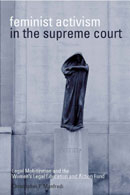Christopher P Manfredi
Professor

PhD, Claremont Graduate School
Judicial politics; legal mobilization; constitutional design; constitutional theory; law and politics.
Rights Litigation and Health Care Policy (with Antonia Maioni)
Rights-based litigation has become an important instrument in the development of health care policy. Funded by the Canadian Institutes for Health Research, this research program examines the use of such litigation by consumers and providers of health care to affect the formulation and implementation of health care policy. In particular, the research program addresses the institutional capacity of courts to formulate policy in this field, as well as the impact of rights-based claims on cross-jurisdictional policy differences in a federal regime.
Citizenship and the Charter
This research program examines the impact of the Canadian Supreme Court’s Charter jurisprudence on the conceptual construction of citizenship in its legal, political, psychological, and sociological dimensions. The range of decisions covered by the research is wide. To flesh out the Court’s understanding of citizenship in its legal dimension, the research program will focus on judicial review of rules governing citizenship and of statutes that make distinctions on the basis of citizenship. The political dimension of citizenship is captured by cases involving democratic rights, political expression and the explicit attempt by the Court to engage legislatures in a form of “dialogue.” Finally, the sociological and psychological dimensions of citizenship are largely at issue in cases involving equality rights.
For a complete list of publications, see Chris Manfredi’s CV
 Feminist Activism in the Supreme Court: Legal Mobilization and the Women’s Legal Education and Action Fund (University of British Columbia Press, 2004).
Feminist Activism in the Supreme Court: Legal Mobilization and the Women’s Legal Education and Action Fund (University of British Columbia Press, 2004).
(co-editor with J. Magnet, G-A. Beaudoin, and G. Gall). The Canadian Charter of Rights and Freedoms: Reflections on the Charter after Twenty Years (Butterworths-LexisNexis, 2003).
Judicial Power and the Charter: Canada and the Paradox of Liberal Constitutionalism (2d ed., Oxford University Press, 2001).
(with Antonia Maioni) “Rights and Public Health in the Balance: Tobacco Control in Canada,” in Ronald Bayer and Eric Feldman, eds. Unfiltered: International Conflict over Tobacco Policy and Public Health (Cambridge, MA: Harvard University Press, 2004): 68-88.
“Strategic Judicial Behaviour and The Canadian Charter of Rights and Freedoms,” in Patrick James, Donald Abelson and Michael Lusztig, eds. The Myth of the Sacred: The Charter, the Courts and the Politics of the Constitution in Canada (Montreal and Kingston: McGill-Queen’s University Press, 2002): 147-67.
(with Antonia Maioni) “Courts and Health Policy: Judicial Policy Making and Publicly Funded Health Care in Canada” Journal of Health Politics, Policy and Law 27 (2002): 211-38.
(with Michael Lusztig) “Why Do Formal Amendments Fail?: An Institutional Design Analysis,” World Politics 50 (1998): 377-400.